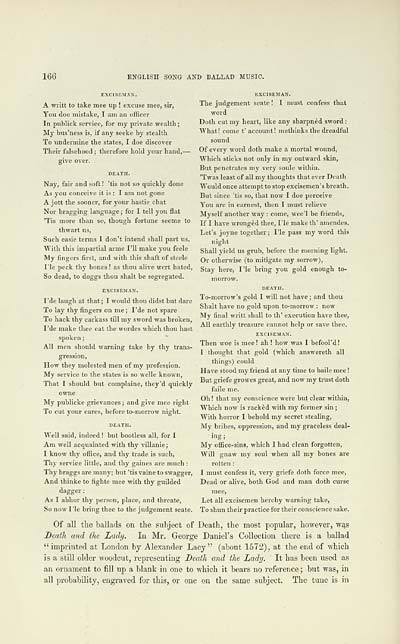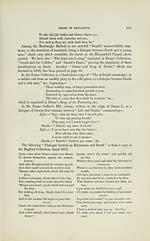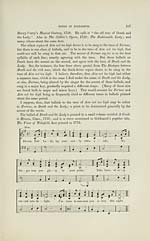Glen Collection of printed music > Printed text > Popular music of the olden time > Volume 1
(200) Page 166
Download files
Complete book:
Individual page:
Thumbnail gallery: Grid view | List view

166
ENGLISH SONG AND BALLAD MUSIC.
EXCISEMAN.
A writt to take mee up ! excuse mee, sir,
You doe mistake, I am an officer
In publick service, for my private wealth ;
My bus'ness is, if any seeke by stealth
To undermine the states, I doe discover
Their falsehood ; therefore hold your hand, —
give over.
DEATH.
Nay, fair and soft ! 'tis not so quickly done
As you conceive it is : I am not gone
A jott the sooner, for your hastie chat
Nor bragging language ; for I tell you flat
'Tis more than so, though fortune seeme to
thwart us.
Such easie terms I don't intend shall part us.
With this impartial arme I'll make you feele
My fingers first, and with this shaft of Steele
I'le peck thy bones ! as thou alive wert hated,
So dead, to doggs thou shalt be segregated.
EXCISEMAN.
I'de laugh at that ; I would thou didst but dare
To lay thy fingers on me ; I'de not spare
To hack thy carkass till my sword was broken,
I'de make thee eat the wordes which thou hast
spoken ;
All men should warning take by thy trans-
gression.
How they molested men of my profession.
My service to the states is so welle known.
That I should but complaine, they'd quickly
owne
My publicke grievances ; and give mee right
To cut your eares, before to-morrow night.
DEATH.
Well said, indeed ! but bootless all, for I
Am well acquainted with thy villanie;
I know thy office, and thy trade is such.
Thy service little, and thy gaines are much :
Thy braggs are many; but 'tis vaine to swagger.
And thinke to fighte mee with thy guilded
dagger :
As I abhor thy person, place, and threate.
So now I'le bring thee to the judgement seate.
EXCISEMAN.
The judgement seate I I must confess that
word
Doth cut my heart, like any sharpned sword :
What! come t' account! methinks the dreadful
sound
Of every word doth make a mortal wound,
Which sticks not only in ray outward skin,
But penetrates my very soule within.
'Twas least of all my thoughts that ever Death
Would once attempt to stop excisemen's breath.
But since 'tis so, that now I doe perceive
You are in earnest, then I must relieve
Myself another way : come, wee'l be friends.
If I have wronged thee, I'le make th' amendes.
Let's joyne together ; I'le pass my word this
night
Shall yield us grub, before the morning light.
Or otherwise (to mitigate my sorrow),
Stay here, I'le bring you gold enough to-
morrow.
DEATH.
To-morrow's gold I will not have ; and thou
Shalt have no gold upon to-morrow : now
My final writt shall to th' execution have thee,
All earthly treasure cannot help or save thee.
EXCISEMAN.
Then woe is mee ! ah ! how was I befool'd !
I thought that gold (which answereth all
things) could
Have stood my friend at any time to baile mee !
But griefe growes great, and now my trust doth
faile me.
Oh ! that my conscience were but clear within,
Which now is racked with my former sin ;
With horror I behold my secret stealing.
My bribes, oppression, and my graceless deal-
ing I
My office-sins, which I had clean forgotten.
Will gnaw my soul when all my bones are
rotten :
I must confess it, very griefe doth force mee,
Dead or alive, both God and man doth curse
mee,
Let all excisemen hereby warning take.
To shun their practice for their conscience sake.
Of all the ballads on the subject of Death, the most popular, however, was
Death and the Lady. In Mr. George Daniel's Collection there is a ballad
"imprinted at London by Alexander Lacy" (about 1572), at the end of which
is a still older woodcut, representing Death and the Lady. ' It has been used as
an ornament to fill up a blank in one to which it bears no reference ; but was, in
all probability, engraved for this, or one on the same subject. The tunc is in
ENGLISH SONG AND BALLAD MUSIC.
EXCISEMAN.
A writt to take mee up ! excuse mee, sir,
You doe mistake, I am an officer
In publick service, for my private wealth ;
My bus'ness is, if any seeke by stealth
To undermine the states, I doe discover
Their falsehood ; therefore hold your hand, —
give over.
DEATH.
Nay, fair and soft ! 'tis not so quickly done
As you conceive it is : I am not gone
A jott the sooner, for your hastie chat
Nor bragging language ; for I tell you flat
'Tis more than so, though fortune seeme to
thwart us.
Such easie terms I don't intend shall part us.
With this impartial arme I'll make you feele
My fingers first, and with this shaft of Steele
I'le peck thy bones ! as thou alive wert hated,
So dead, to doggs thou shalt be segregated.
EXCISEMAN.
I'de laugh at that ; I would thou didst but dare
To lay thy fingers on me ; I'de not spare
To hack thy carkass till my sword was broken,
I'de make thee eat the wordes which thou hast
spoken ;
All men should warning take by thy trans-
gression.
How they molested men of my profession.
My service to the states is so welle known.
That I should but complaine, they'd quickly
owne
My publicke grievances ; and give mee right
To cut your eares, before to-morrow night.
DEATH.
Well said, indeed ! but bootless all, for I
Am well acquainted with thy villanie;
I know thy office, and thy trade is such.
Thy service little, and thy gaines are much :
Thy braggs are many; but 'tis vaine to swagger.
And thinke to fighte mee with thy guilded
dagger :
As I abhor thy person, place, and threate.
So now I'le bring thee to the judgement seate.
EXCISEMAN.
The judgement seate I I must confess that
word
Doth cut my heart, like any sharpned sword :
What! come t' account! methinks the dreadful
sound
Of every word doth make a mortal wound,
Which sticks not only in ray outward skin,
But penetrates my very soule within.
'Twas least of all my thoughts that ever Death
Would once attempt to stop excisemen's breath.
But since 'tis so, that now I doe perceive
You are in earnest, then I must relieve
Myself another way : come, wee'l be friends.
If I have wronged thee, I'le make th' amendes.
Let's joyne together ; I'le pass my word this
night
Shall yield us grub, before the morning light.
Or otherwise (to mitigate my sorrow),
Stay here, I'le bring you gold enough to-
morrow.
DEATH.
To-morrow's gold I will not have ; and thou
Shalt have no gold upon to-morrow : now
My final writt shall to th' execution have thee,
All earthly treasure cannot help or save thee.
EXCISEMAN.
Then woe is mee ! ah ! how was I befool'd !
I thought that gold (which answereth all
things) could
Have stood my friend at any time to baile mee !
But griefe growes great, and now my trust doth
faile me.
Oh ! that my conscience were but clear within,
Which now is racked with my former sin ;
With horror I behold my secret stealing.
My bribes, oppression, and my graceless deal-
ing I
My office-sins, which I had clean forgotten.
Will gnaw my soul when all my bones are
rotten :
I must confess it, very griefe doth force mee,
Dead or alive, both God and man doth curse
mee,
Let all excisemen hereby warning take.
To shun their practice for their conscience sake.
Of all the ballads on the subject of Death, the most popular, however, was
Death and the Lady. In Mr. George Daniel's Collection there is a ballad
"imprinted at London by Alexander Lacy" (about 1572), at the end of which
is a still older woodcut, representing Death and the Lady. ' It has been used as
an ornament to fill up a blank in one to which it bears no reference ; but was, in
all probability, engraved for this, or one on the same subject. The tunc is in
Set display mode to: Large image | Transcription
Images and transcriptions on this page, including medium image downloads, may be used under the Creative Commons Attribution 4.0 International Licence unless otherwise stated. ![]()
| Special collections of printed music > Glen Collection of printed music > Printed text > Popular music of the olden time > Volume 1 > (200) Page 166 |
|---|
| Permanent URL | https://digital.nls.uk/91369847 |
|---|
| Shelfmark | Glen.254 |
|---|---|
| Additional NLS resources: | |
| Attribution and copyright: |
|
| Description | Scottish songs and music of the 18th and early 19th centuries, including music for the Highland bagpipe. These are selected items from the collection of John Glen (1833 to 1904). Also includes a few manuscripts, some treatises, and other books on the subject. |
|---|
| Description | The Glen Collection and the Inglis Collection represent mainly 18th and 19th century Scottish music, including Scottish songs. The collections of Berlioz and Verdi collected by bibliographer Cecil Hopkinson contain contemporary and later editions of the works of the two composers Berlioz and Verdi. |
|---|

